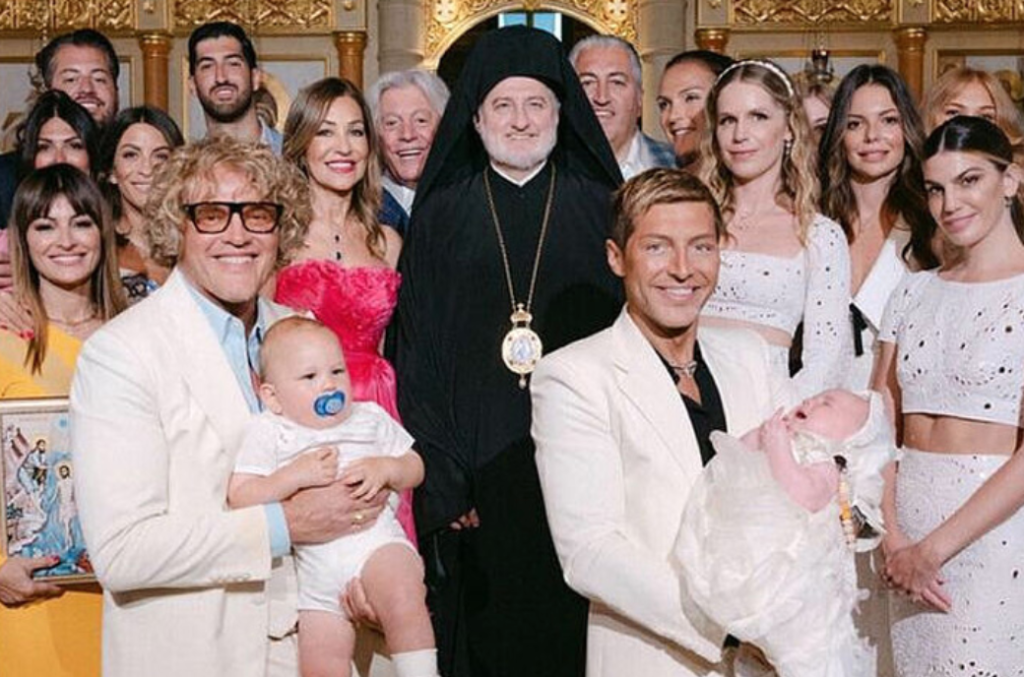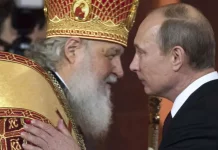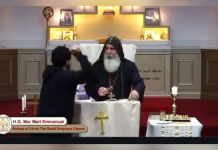I received not long ago an e-mail from a reader who says that her Methodist congregation is in the midst of a conversation about whether or not to disaffiliate from the United Methodist Church over gay marriage. The reader shared the arguments for both sides in her moderately conservative congregation, and asked what I thought. Looking at her list of “stay” arguments, I saw a bunch of propositions that were either deceptive (self-deceptive?) or wishful thinking. The stay argument, as she presents it, amounts to this: If we leave, we will be breaking fellowship with a national organization that has been good to us, and we will side with the closed-minded who are unwelcoming to diverse points of view. We want to stay open to all. Besides, we have been told by state leaders that they will respect our congregational autonomy, and will do their best to send us pastors who are a good fit for our more conservative congregation.
I told the reader that this is all eyewash, whether the proponents of that argument realize it or not. I don’t know that congregation, of course, but I can imagine that at least some of the conservatives are not at all ideological. When I was growing up in a Methodist church in the 1970s and early 1980s, you could call it conservative, but its conservatism had almost nothing to do with doctrine or politics, and everything to do with the fact that the congregation cherished stability, and wanted things to stay the same. I went through a brief period of Evangelical intensity when I was twelve and thirteen, and asked my mom to take me to worship at the local Baptist church, which I believed took doctrine more seriously. It wasn’t that our family’s Methodist parish was liberal, but rather that it avoided taking stands on anything, and folks seemed to like it that way. Its conservatism, at least during my childhood, was entirely temperamental. Point is, the term “conservative” can mean different things.
As a matter of fact, I’m told by family members who still attend there that the congregation is now in the discernment process over its future. I can easily imagine that there are folks in the congregation who aren’t particularly in favor of holding same-sex weddings in the church, but who find the idea of leaving the national church off-putting, because they don’t want to rock the boat. It’s a beautiful little church, and though I haven’t been a worshiper there for decades, it’s not at all hard for me to imagine how protective people feel of it. I don’t have any idea how the congregation is ultimately going to go, because I’ve lost touch with them. I find myself wondering tonight how my late sister Ruthie, who was an active member of that congregation, would vote. I’m fairly confident that Ruthie would have come down on the theologically conservative side of the argument, but not at all confident that she would have voted to leave. For her, church was more about the community, and if she had a sense that keeping the community together required her to give way on the LGBT issue, she might have done it. Or not. I honestly don’t know — but the fact that she was precisely one of the church members whose conservatism was not theological, but dispositional, tells me that I couldn’t hazard a guess for how that congregation will vote.
I would say to those members who believe that their congregation can stay safely conservative within a liberal denomination what I said to my Methodist reader: that position is simply untenable today. For one thing, we have lots of evidence from the experiences of churches that have already liberalized that once the progressives gain control of the denomination, the promised tolerance for traditionalist dissenters disappears. And I understand why! If you truly believe that homosexuality is blessed by God, and that same-sex marriage is a good thing, then why should you tolerate congregations that treat gay people like second-class Christians? Is maintaining church unity more important than justice? If I were a progressive, I would say no, it’s not. After all, progressives, religious and not, regard homosexuality as the moral equivalent of race. Would a national denomination tolerate congregations that declined to marry people of color, or interracial couples? I can’t see it. If I were in a church that asked its members to tolerate congregations that practiced open racism, I would find that intolerable. The idea that the United Methodist Church, after most of its traditionalists have departed this year, will be tolerant and supportive of conservative congregations who stay, is unpersuasive in the extreme.
I am a traditionalist on these matters. Scripture is so clear and strong on the question of homosexuality that I could not stay in a denomination that treated the question of same-sex marriage as a matter of local opinion. Whether you are pro-SSM or anti-SSM, it is a very big deal, for what the practice says about the authority of Scripture and the Bible’s teaching about what sex is, what marriage and married love is for, and indeed what it means to be a man or a woman created in God’s image. It’s such a big issue that I simply cannot see Christians agreeing to disagree within the same communion, as if something so central to Christian life was ancillary to the real work of the Church. I was once at a private meeting not long after the Obergefell decision, and listened as Evangelical laity debated what their churches’ stance should be going forward. One visibly frustrated woman who held a high-profile job in a liberal corporation, blurted out, “I wish we could just get past this issue and get back to proclaiming the Gospel!” For her, “proclaiming the Gospel” was about getting individuals to pray the Sinner’s Prayer and to accept Jesus into their hearts. As far as I could tell, that was the gist of Christianity. The rest was details. Now, I didn’t know this woman, but I bet if I had pressed her, she would have said that there’s a lot more to Christian living that simply accepting Jesus into one’s heart. But knowing from an earlier conversation what her job was, it was very easy to imagine the immense pressure she was under to conform to the progressive opinions of her professional milieu. She was looking for a way out that would allow her to feel that she had not betrayed Christ. I don’t think that way exists.
The Church of England is still trying to find it, though. The Church’s bishops recently said no to gay marriage, but yes to providing a rite of blessing for same-sex couples. It’s not going to work, as Carl Trueman explains in his latest column. He leads by citing a public letter issued by Penny Mordaunt, a top Tory politician, calling on the House of Bishops to offer gay marriage. Trueman comments on the Mordaunt letter:
Second, it raises the question of what exactly conservatism is today, as Mordaunt represents the Conservative Party. The Trump phenomenon indicated a bankruptcy of ideas in political discourse, thriving for a brief time in a world where the left was detached from the reality of most people’s concerns and a right that seemed to define itself simply in terms of reaction. But Trump is fading, as is the moment that gave the British people Brexit. What do conservatives have to offer for the future? Little more, it seems, than progressive pieties glossed with a traditionalist veneer. What exactly do they wish to conserve? Not much, if Mordaunt is representative (and as Leader of the House, she is scarcely a political outlier). The conservatism represented by Penny Mordaunt seems to have adopted the basic tenets of anti-conservatism.
This is relevant to the debate here in the US, within the churches. We have seen that political conservatism is becoming far more tolerant of LGBT than it has been, with now a bare majority of Republican voters approving of same-sex marriage. These numbers are only going to increase as older GOP voters die off. Even within churches that are conservative, there will be pressure to moderate the Biblical teaching — if not to change it, then to de-emphasize it. My information on this is entirely anecdotal, but I believe that many conservative pastors don’t ever talk about the issue, or about sex at all, to avoid controversy. But they’re not going to be able to avoid it forever. What happens when the gay son or daughter of a prominent family in the church wants to get married there? Over the past twenty years, so many conservatives, even Christians, have flipped on the issue when one of their children came out as gay. With the general sense in society moving steadily towards the normalization of homosexuality, even among people on the Right, it is unrealistic to think that conservative churches can avoid having to deal forthrightly with the question. Given that few GOP politicians have found the courage or the cleverness to defend traditional marriage in the public square over the past twenty years, we can expect more and more conservatives, both in politics and in leadership positions in civil society, to embrace “progressive pieties glossed with a traditionalist veneer.”
Archbishop Elpidophoros, the head of the Greek Orthodox Church in the US, got into trouble last year when he went to Greece and baptized the children of a gay couple, one-half of whom is the son of a rich Greek family from Chicago:

A number of Orthodox lay commentators, as well as Greek bishops, protested that this was out of bounds, and the first step towards accepting same-sex marriage in the very conservative church. But the Ecumenical Patriarch, who oversees the Greek church, seemed to side with the liberal Elpidophoros.
Similarly, among Catholics, the Jesuit Father James Martin continues his high-profile ministry to promote affirmation of LGBT Catholics without repentance. Though he is usually careful not to cross doctrinal lines — he is a Jesuit, after all — nobody is fooled about where Father Martin stands on these matters. Nobody. And Pope Francis has taken several occasions to praise Martin’s work. Plus, Francis has promoted bishops, like Chicago’s Cardinal Cupich and Newark’s Cardinal Tobin, who go about as far as you can go to signal LGBT affirmation without openly repudiating Catholic teaching. Most of the German bishops have flatly rejected Catholic teaching, and if Francis appoints the progressive, openly pro-gay German bishop Heiner Wilmer to head the CDF, the Catholic Church’s doctrinal office, as the Pope has been long rumored to be planning, then what would Catholics worldwide be left to make of Catholicism’s teaching on homosexuality? Would it not be, under this pope, a case of proclaiming progressive pieties under a traditionalist veneer?
Among Evangelicals, here’s Atlanta megachurch pastor Andy Stanley:
Read it all in The American Conservative










